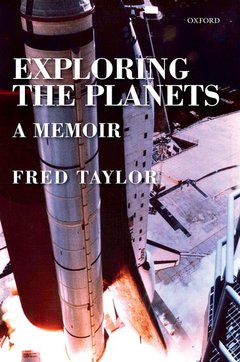Description
Exploring the Planets
A Memoir
Author: Taylor Fred
Language: English
Subjects for Exploring the Planets:
Publication date: 02-2016
382 p. · 16.3x23.8 cm · Hardback
382 p. · 16.3x23.8 cm · Hardback
Description
/li>Biography
/li>
The planets fascinate us, and naturally we care about our own Earth, and things like how well we can forecast the weather and whether climate is really changing. Exploring the Planets offers a personal account on how the space programme evolved. It begins in the era of the first blurry views of our Earth as seen from space, and ends with current plans for sophisticated robots on places as near as our neighbours Venus and Mars and as far away as the rainy lakelands of Saturn's planet-sized moon Titan. Examining the scientific goals of these complex voyages of discovery, and the joys and hardships of working to achieve them. The Space Age is now about 50 years old and for those lucky enough to be part of it at its inception, it's filled a worklong lifetime. Today, several satellites around the Earth have studied the atmosphere and the climate using instruments on board that the author helped design and build. 'Deep space' missions were embarked upon to visit the planets: all of the major bodies (six planets, the Moon and minor bodies, asteroids and comets) of the classical Solar System have been scrutinised close-up by experiments built in various laboratories worldwide. Most of the narrative is based on the author's experiences at the world's space agencies, research labs, and conferences, and at other places as diverse as Cape Canaveral and No. 10 Downing Street.
Fred Taylor is Halley Professor of Physics Emeritus at Oxford University, UK, a Fellow of Jesus College, Oxford and a member of the Oxford Physics Department where he was head of Atmospheric, Oceanic & Planetary Physics for 21 years. He was educated at the University of Liverpool, and Oxford University. After graduating he spent ten years in the USA, in the Space Science Division of the Jet Propulsion Laboratory, California Institute of Technology. He was Principle Investigator on the Pioneer Venus Orbiter in 1979, making the first systematic study of meteorology of the atmosphere of Venus. He is currently participating in a number of planetary and Earth Observation space experiments, as well as contribution to theoretical work and modelling on problems in atmospheric and oceanic physics, such as ozone depletion, the greenhouse effect and climate change.
© 2024 LAVOISIER S.A.S.
These books may interest you

Planetary Magnetism 210.99 €



